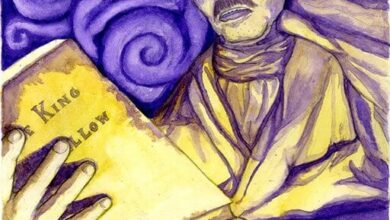
CHAPTER VII.
DULL BUT NECESSARY.
Whoever cares only for incident and action in a book had better skip this chapter and read on; but those who take an interest in the delineation of character will find the key to Sylvia’s here.
John Yule might have been a poet, painter, or philanthropist, for Heaven had endowed him with fine gifts; he was a prosperous merchant with no ambition but to leave a fortune to his children and live down the memory of a bitter past. On the threshold of his life he stumbled and fell; for as he paused there, waiting for the first step to appear, Providence tested and found him wanting. On one side, Poverty offered the aspiring youth her meagre hand; but he was not wise enough to see the virtues hidden under her hard aspect, nor brave enough to learn the stern yet salutary lessons which labor, necessity, and patience teach, giving to those who serve and suffer the true success. On the other hand Opulence allured him with her many baits, and, silencing the voice of conscience, he yielded to temptation and wrecked his nobler self.
A loveless marriage was the price he paid for his ambition; not a costly one, he thought, till time taught him that whosoever mars the integrity of his own soul by transgressing the great laws of life, even by so much as a hair’s breadth, entails upon himself and heirs the inevitable retribution which proves their worth and keeps them sacred. The tie that bound and burdened the unhappy twain, worn thin by constant friction, snapped at last, and in the solemn pause death made in his busy life, there rose before him those two ghosts who sooner or later haunt us all, saying with reproachful voices,–“This I might have been,” and “This I am.” Then he saw the failure of his life. At fifty he found himself poorer than when he made his momentous choice; for the years that had given him wealth, position, children, had also taken from him youth, self-respect, and many a gift whose worth was magnified by loss. He endeavored to repair the fault so tardily acknowledged, but found it impossible to cancel it when remorse, embittered effort, and age left him powerless to redeem the rich inheritance squandered in his prime.
If ever man received punishment for a self-inflicted wrong it was John Yule. A punishment as subtle as the sin; for in the children growing up about him every relinquished hope, neglected gift, lost aspiration, seemed to live again; yet on each and all was set the direful stamp of imperfection, which made them visible illustrations of the great law broken in his youth.
In Prudence, as she grew to womanhood, he saw his own practical tact and talent, nothing more. She seemed the living representative of the years spent in strife for profit, power, and place; the petty cares that fret the soul, the mercenary schemes that waste a life, the worldly formalities, frivolities, and fears, that so belittle character. All these he saw in this daughter’s shape; and with pathetic patience bore the daily trial of an over active, over anxious, affectionate but most prosaic child.
In Mark he saw his ardor for the beautiful, his love of the poetic, his reverence for genius, virtue, heroism. But here too the subtle blight had fallen. This son, though strong in purpose was feeble in performance; for some hidden spring of power was wanting, and the shadow of that earlier defeat chilled in his nature the energy which is the first attribute of all success. Mark loved poetry, and “wrote in numbers for the numbers came;” but, whether tragic, tender, or devout, in each attempt there was enough of the divine fire to warm them into life, yet not enough to gift them with the fervor that can make a line immortal, and every song was a sweet lament for the loftier lays that might have been. He loved art and gave himself to it; but though studying all forms of beauty he never reached its soul, and every effort tantalized him with fresh glimpses of the fair ideal which he could not reach. He loved the true, but high thoughts seldom blossomed into noble deeds; for when the hour came the man was never ready, and disappointment was his daily portion. A sad fate for the son, a far sadder one for the father who had bequeathed it to him from the irrecoverable past.
In Sylvia he saw, mysteriously blended, the two natures that had given her life, although she was born when the gulf between regretful husband and sad wife was widest. As if indignant Nature rebelled against the outrage done her holiest ties, adverse temperaments gifted the child with the good and ill of each. From her father she received pride, intellect, and will; from her mother passion, imagination, and the fateful melancholy of a woman defrauded of her dearest hope. These conflicting temperaments, with all their aspirations, attributes, and inconsistencies, were woven into a nature fair and faulty; ambitious, yet not self-reliant; sensitive, yet not keen-sighted. These two masters ruled soul and body, warring against each other, making Sylvia an enigma to herself and her life a train of moods.
A wise and tender mother would have divined her nameless needs, answered her vague desires, and through the medium of the most omnipotent affection given to humanity, have made her what she might have been. But Sylvia had never known mother-love, for her life came through death; and the only legacy bequeathed her was a slight hold upon existence, a ceaseless craving for affection, and the shadow of a tragedy that wrung from the pale lips, that grew cold against her baby cheek, the cry, “Free at last, thank God for that!”
Prudence could not fill the empty place, though the good-hearted housewife did her best. Neither sister understood the other, and each tormented the other through her very love. Prue unconsciously exasperated Sylvia, Sylvia unconsciously shocked Prue, and they hitched along together each trying to do well and each taking diametrically opposite measures to effect her purpose. Mark briefly but truly described them when he said, “Sylvia trims the house with flowers, but Prudence dogs her with a dust-pan.”
Mr. Yule was now a studious, melancholy man, who, having said one fatal “No” to himself, made it the satisfaction of his life to say a never varying “Yes” to his children. But though he left no wish of theirs ungratified, he seemed to have forfeited his power to draw and hold them to himself. He was more like an unobtrusive guest than a master in his house. His children loved, but never clung to him, because unseen, yet impassible, rose the barrier of an instinctive protest against the wrong done their dead mother, unconscious on their part but terribly significant to him.
Mark had been years away; and though the brother and sister were tenderly attached, sex, tastes, and pursuits kept them too far apart, and Sylvia was solitary even in this social seeming home. Dissatisfied with herself, she endeavored to make her life what it should be with the energy of an ardent, aspiring nature; and through all experiences, sweet or bitter, all varying moods, successes and defeats, a sincere desire for happiness the best and highest, was the little rushlight of her soul that never wavered or went out.
She never had known friendship in its truest sense, for next to love it is the most abused of words. She had called many “friend,” but was still ignorant of that sentiment, cooler than passion, warmer than respect, more just and generous than either, which recognizes a kindred spirit in another, and claiming its right, keeps it sacred by the wise reserve that is to friendship what the purple bloom is to the grape, a charm which once destroyed can never be restored. Love she had desired, yet dreaded, knowing her own passionate nature, and when it came to her, making that brief holiday the fateful point of her life, she gave herself to it wholly. Before that time she had rejoiced over a more tranquil pleasure, and believed that she had found her friend in the neighbor who after long absence had returned to his old place.
Nature had done much for Geoffrey Moor, but the wise mother also gave him those teachers to whose hard lessons she often leaves her dearest children. Five years spent in the service of a sister, who, through the sharp discipline of pain was fitting her meek soul for heaven, had given him an experience such as few young men receive. This fraternal devotion proved a blessing in disguise; it preserved him from any profanation of his youth, and the companionship of the helpless creature whom he loved had proved an ever present stimulant to all that was best and sweetest in the man. A single duty faithfully performed had set the seal of integrity upon his character, and given him grace to see at thirty the rich compensation he had received for the ambitions silently sacrificed at twenty-five. When his long vigil was over he looked into the world to find his place again. But the old desires were dead, the old allurements had lost their charm, and while he waited for time to show him what good work he should espouse, no longing was so strong as that for a home, where he might bless and be blessed in writing that immortal poem a virtuous and happy life.
Sylvia soon felt the power and beauty of this nature, and remembering how well he had ministered to a physical affliction, often looked into the face whose serenity was a perpetual rebuke, longing to ask him to help and heal the mental ills that perplexed and burdened her. Moor soon divined the real isolation of the girl, read the language of her wistful eyes, felt that he could serve her, and invited confidence by the cordial alacrity with which he met her least advance.
But while he served he learned to love her, for Sylvia, humble in her own conceit, and guarded by the secret passion that possessed her, freely showed the regard she felt, with no thought of misapprehension, no fear of consequences. Unconscious that such impulsive demonstration made her only more attractive, that every manifestation of her frank esteem was cherished in her friend’s heart of hearts, and that through her he was enjoying the blossom time of life. So peacefully and pleasantly the summer ripened into autumn and Sylvia’s interest into an enduring friendship.
CHAPTER VIII.

NO.
Drawn curtains shut out the frosty night, the first fire of the season burned upon the hearth, and basking in its glow sat Sylvia, letting her thoughts wander where they would. As books most freely open at pages oftenest read, the romance of her summer life seldom failed to unclose at passages where Warwick’s name appeared. Pleasant as were many hours of that time, none seemed so full of beauty as those passed with him, and sweetest of them all the twilight journey hand in hand. It now returned to her so freshly that she seemed to hear again the evening sounds, to feel the warm, fern-scented wind blow over her, to see the strong hand offered helpfully, and with an impulse past control she stretched her own to that visionary Warwick as the longing of her heart found vent in an eager
“Come!”
“I am here.”
A voice replied, a hand pressed hers, and springing up she saw, not Adam, but Moor, standing beside her with a beaming face. Concealing the thrill of joy, the pang of pain he had brought her, she greeted him cordially, and reseating herself, instinctively tried to turn the current of her thoughts.
“I am glad you came, for I have built castles in the air long enough, and you will give me more substantial entertainment, as you always do.”
The broken dream had left tokens of its presence in the unwonted warmth of Sylvia’s manner; Moor felt it, and for a moment did not answer. Much of her former shyness had crept over her of late; she sometimes shunned him, was less free in conversation, less frank in demonstration, and once or twice had colored deeply as she caught his eye upon her. These betrayals of Warwick’s image in her thoughts seemed to Moor the happy omens he had waited eagerly to see, and each day his hope grew more assured. He had watched her unseen while she was busied with her mental pastime, and as he looked his heart had grown unspeakably tender, for never had her power over him been so fully felt, and never had he so longed to claim her in the name of his exceeding love. A pleasant peace reigned through the house, the girl sat waiting at his side, the moment looked auspicious, the desire grew irresistible, and he yielded to it.
“You are thinking of something new and pleasant to tell me, I hope,–something in keeping with this quiet place and hour,” said Sylvia, glancing up at him with the traitorous softness still in her eyes.
“Yes, and hoping you would like it.”
“Then I have never heard it before?”
“Never from me.”
“Go on, please; I am ready.”
She folded her hands together on her knee, turned her face attentively to his, and unwittingly composed herself to listen to the sweet story so often told, and yet so hard to tell. Moor meant to woo her very gently, for he believed that love was new to her. He had planned many graceful illustrations for his tale, and rounded many smoothly-flowing sentences in which to unfold it. But the emotions are not well bred, and when the moment came nature conquered art. No demonstration seemed beautiful enough to grace the betrayal of his passion, no language eloquent enough to tell it, no power strong enough to hold in check the impulse that mastered him. He went to her, knelt down upon the cushion at her feet, and lifting to her a face flushed and fervent with the ardor of a man’s first love, said impetuously–
“Sylvia, read it here!”
There was no need for her to look; act, touch, and tone told the story better than the most impassioned speech. The supplication of his attitude, the eager beating of his heart, the tender pressure of his hand, dispelled her blindness in the drawing of a breath, and showed her what she had done. Now neglected warnings, selfish forgetfulness, and the knowledge of an unconscious but irremediable wrong frightened and bewildered her; she hid her face and shrunk back trembling with remorse and shame. Moor, seeing in her agitation only maiden happiness or hesitancy, accepted and enjoyed a blissful moment while he waited her reply. It was so long in coming that he gently tried to draw her hands away and look into her face, whispering like one scarcely doubtful of assent–
“You love me, Sylvia?”
“No.”
Only half audible was the reluctant answer, yet he heard it, smiled at what he fancied a shy falsehood, and said tenderly–
“Will you let me love you, dear?”
“No.”
Fainter than before was the one word, but it reached and startled him. Hurriedly he asked–
“Am I nothing to you but a friend?”
“No.”
With a quick gesture he put down her hands and looked at her. Grief, regret, and pity, filled her face with trouble, but no love was there. He saw, yet would not believe the truth, felt that the sweet certainty of love had gone, yet could not relinquish the fond hope.
“Sylvia, do you understand me?”
“I do, I do! but I cannot say what you would have me, and I must tell the truth, although it breaks my heart. Geoffrey, I do not love you.”
“Can I not teach you?” he pleaded eagerly.
“I have no desire to learn.”
Softly she spoke, remorseful she looked, but the words wounded like a blow. All the glad assurance died, the passionate glow faded, the caress, half tender, half timid, fell away, and nothing of the happy lover remained in face or figure. He rose slowly as if the heavy disappointment oppressed both soul and body. He fixed on her a glance of mingled incredulity, reproach, and pain, and said, like one bent on ending suspense at once–
“Did you not see that I loved you? Can you have been trifling with me? Sylvia, I thought you too simple and sincere for heartless coquetry.”
“I am! You shall not suspect me of that, though I deserve all other reproaches. I have been very selfish, very blind. I should have remembered that in your great kindness you might like me too well for your own peace. I should have believed Mark, and been less candid in my expressions of esteem. But I wanted a friend so much; I found all I could ask in you; I thought my youth, my faults, my follies, would make it impossible for you to see in me anything but a wayward girl, who frankly showed her regard, and was proud of yours. It was one of my sad mistakes; I see it now; and now it is too late for anything but penitence. Forgive me if you can; I’ve taken all the pleasure, and left you all the pain.”
Sylvia spoke in a paroxysm of remorseful sorrow. Moor listened with a sinking heart, and when she dropped her face into her hands again, unable to endure the pale expectancy of his, he turned away, saying with an accent of quiet despair–
“Then I have worked and waited all this summer to see my harvest fail at last. Oh, Sylvia, I so loved, so trusted you.”
He leaned his arm on the low chimney piece, laid down his head upon it and stood silent, trying to forgive.
It is always a hard moment for any woman, when it demands her bravest sincerity to look into a countenance of eager love, and change it to one of bitter disappointment by the utterance of a monosyllable. To Sylvia it was doubly hard, for now her blindness seemed as incredible as cruel; her past frankness unjustifiable; her pleasure selfish; her refusal the blackest ingratitude, and her dream of friendship forever marred. In the brief pause that fell, every little service he had rendered her, rose freshly in her memory; every hour of real content and genuine worth that he had given her, seemed to come back and reproach her; every look, accent, action, of both happy past and sad present seemed to plead for him. Her conscience cried out against her, her heart overflowed with penitence and pity. She looked at him, longing to say something, do something that should prove her repentance, and assure him of the affection which she felt. As she looked, two great tears fell glittering to the hearth, and lay there such eloquent reproaches, that, had Sylvia’s heart been hard and cold as the marble where they shone, it would have melted then. She could not bear it, she went to him, took in both her own the rejected hand that hung at his side, and feeling that no act could too tenderly express her sorrow, lifted it to her lips and softly kissed it.
An instant she was permitted to lay her cheek against it as a penitent child mutely imploring pardon might have done. Then it broke from her hold, and gathering her to himself, Moor looked up exclaiming with renewed hope, unaltered longing–
“You do care for me, then? You give yourself to me in spite of that hard No? Ah, Sylvia, you are capricious even in your love.”
She could not answer, for if that first No had been hard to utter, this was impossible. It seemed like turning the knife in the wound, to disappoint the hope that had gathered strength from despair, and she could only lay her head down on his breast, weeping the saddest tears she had ever shed. Still happy in his new delusion, Moor softly stroked the shining hair, smiling so tenderly, so delightedly, that it was well for her she did not see the smile, the words were enough.
“Dear Sylvia, I have tried so hard to make you love me, how could you help it?”
The reason sprung to her lips, but maiden pride and shame withheld it. What could she tell except that she had cherished a passion, based only on a look. She had deceived herself in her belief that Moor was but a friend, might she not also have deceived herself in believing Warwick was a lover? She could not own this secret, its betrayal could not alter her reply, nor heal Moor’s wound, but the thought of Warwick strengthened her. It always did, as surely as the influence of his friend always soothed her, for one was an embodiment of power, the other of tenderness.
“Geoffrey, let me be true to you and to myself,” she said, so earnestly that it gave weight to her broken words. “I cannot be your wife, but I can be your dear friend forever. Try to believe this,–make my task easier by giving up your hope,–and oh, be sure that while I live I cannot do enough to show my sorrow for the great wrong I have done you.”
“Must it be so? I find it very hard to accept the truth and give up the hope that has made my happiness so long. Let me keep it, Sylvia; let me wait and work again. I have a firm belief that you _will_ love me yet, because I cleave to you with heart and soul, long for you continually, and think you the one woman of the world.”
“Ah, if it were only possible!” she sighed.
“Let me make it so! In truth, I think I should not labor long. You are so young, dear, you have not learned to know your own heart yet. It was not pity nor penitence alone that brought you here to comfort me. Was it, Sylvia?”
“Yes. Had it been love, could I stand as I am now and not show it?”
She looked up at him, showed him that though her cheeks were wet there was no rosy dawn of passion there; though her eyes were as full of affection as of grief, there was no shy avoidance of his own, no dropping of the lids, lest they should tell too much; and though his arm encircled her, she did not cling to him as loving women cling when they lean on the strength which, touched by love, can both cherish and sustain. That look convinced him better than a flood of words. A long sigh broke from his lips, and, turning from her the eyes that had so wistfully searched and found not, they went wandering drearily hither and thither as if seeking the hope whose loss made life seem desolate. Sylvia saw it, groaned within herself, but still held fast to the hard truth, and tried to make it kinder.
“Geoffrey, I once heard you say to Mark, ‘Friendship is the best college character can graduate from. Believe in it, seek for it, and when it comes keep it as sacredly as love.’ All my life I have wanted a friend, have looked for one, and when he came I welcomed him. May I not keep him, and preserve the friendship dear and sacred still, although I cannot offer love?”
Softly, seriously, she spoke, but the words sounded cold to him; friendship seemed so poor now, love so rich, he could not leave the blessed sunshine which transfigured the whole earth and sit down in the little circle of a kindly fire without keen regret.
“I should say yes, I will try to do it if nothing easier remains to me. Sylvia, for five years I have longed and waited for a home. Duty forbade it then, because poor Marion had only me to make her sad life happy, and my mother left her to my charge. Now the duty is ended, the old house very empty, my heart very hungry for affection. You are all in all to me, and I find it so difficult to relinquish my dream that I must be importunate. I have spoken too soon, you have had no time to think, to look into yourself and question your own heart. Go, now, recall what I have said, remember that I will wait for you patiently, and when I leave, an hour hence, come down and give me my last answer.”
Sylvia was about to speak, but the sound of an approaching step brought over her the shyness she had not felt before, and without a word she darted from the room. Then romance also fled, for Prue came bustling in, and Moor was called to talk of influenzas, while his thoughts were full of love.
Alone in her chamber Sylvia searched herself. She pictured the life that would be hers with Moor. The old house so full of something better than its opulence, an atmosphere of genial tranquillity which made it home-like to whoever crossed its threshold. Herself the daily companion and dear wife of the master who diffused such sunshine there; whose serenity soothed her restlessness; whose affection would be as enduring as his patience; whose character she so truly honored. She felt that no woman need ask a happier home, a truer or more tender lover. But when she looked into herself she found the cordial, unimpassioned sentiment he first inspired still unchanged, and her heart answered–
“This is friendship.”
She thought of Warwick, and the other home that might be hers. Fancy painted in glowing colors the stirring life, the novelty, excitement, and ever new delight such wanderings would have for her. The joy of being always with him; the proud consciousness that she was nearest and dearest to such a man; the certainty that she might share the knowledge of his past, might enjoy his present, help to shape his future. There was no time to look into her heart, for up sprung its warm blood to her cheek, its hope to her eye, its longing to her lips, its answer glad and ready–
“Ah, this is love!”
The clock struck ten, and after lingering a little Sylvia went down. Slowly, because her errand was a hard one; thoughtfully, because she knew not where nor how she could best deliver it. No need to look for him or linger for his coming; he was already there. Alone in the hall, absently smoothing a little silken shawl she often wore, and waiting with a melancholy patience that smote her to the heart. He went to meet her, took both her hands in his, and looked into her face so tenderly, so wistfully!–
“Sylvia, is it good night or good by?”
Her eyes filled, her hands trembled, her color paled, but she answered steadily–
“Forgive me; it is good by.”




